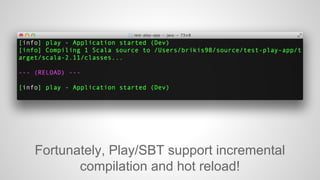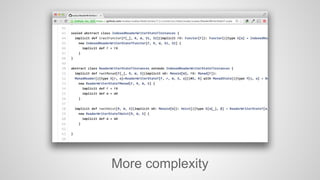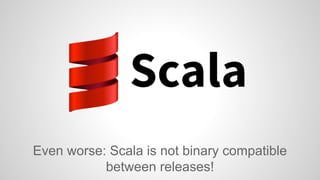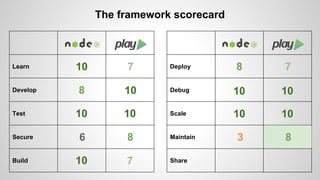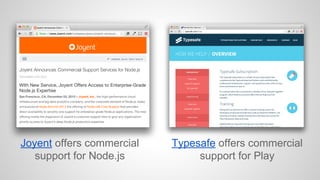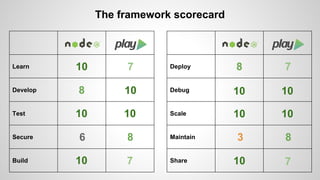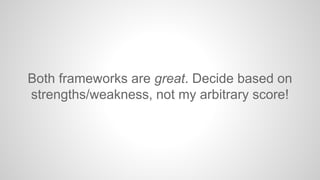Node.js vs Play Framework
- 1. VS Node.js vs Play Framework
- 2. Node.js: server-side JavaScript runtime environment; open source; single threaded; non-blocking I/O.
- 3. express.js: the most popular web framework for Node.js.
- 4. Play Framework: Java/Scala web framework; open source; multithreaded; non-blocking I/O.
- 5. Yevgeniy Brikman Former Play Tech Lead at LinkedIn. Long time Node.js user.
- 6. The framework scorecard Learn Develop Test Secure Build Deploy Debug Scale Maintain Share
- 7. For each feature we discuss... 1 Much worse than most frameworks About the same as most frameworks Much better than most frameworks 5 10
- 8. The framework scorecard Learn Develop Test Secure Build Deploy Debug Scale Maintain Share
- 9. Node.js: 1-click installers for every OS
- 10. var http = require('http'); http.createServer(function (req, res) { res.writeHead(200, {'Content-Type': 'text/plain'}); res.end('Hello Worldn'); }).listen(1337, '127.0.0.1'); console.log('Server running at http://127.0.0.1:1337/'); server.js The “Hello World” Node app: 1 file, 6 lines of code.
- 11. var express = require('express'); var app = express(); app.get('/', function(req, res){ res.send('Hello World'); }); var server = app.listen(1337, function() { console.log('Listening on port %d', server.address().port); }); server.js The “Hello World” Express app: 1 file, 8 lines of code.
- 12. Run using node <filename>. Starts instantly!
- 14. nodeschool.io
- 15. Node Beginner Book, Mastering Node.js, Node: Up and Running, Node.js in Action
- 16. Node API Docs
- 17. Express.js guide
- 18. Express Web Application Development Express.js Guide
- 20. And much, much more Tons of resources; very gradual learning curve.
- 21. Learn Develop Test Secure Build The framework scorecard Deploy Debug Scale Maintain Share 10
- 22. Learn Develop Test Secure Build The framework scorecard Deploy Debug Scale Maintain Share 10
- 23. Play: download from playframework.com, extract, add activator to your PATH
- 24. Generate a new app using activator new
- 25. The “Hello World” Play app: ~35 files and folders
- 26. Run the app using activator run
- 27. (Downloading all dependencies can take a while the first time around)
- 31. Play for Scala Learning Play Framework 2
- 32. Ultimate Guide to Getting Started with Play. Not as many resources; steep learning curve.
- 33. Learn Develop Test Secure Build The framework scorecard Deploy Debug Scale Maintain Share 10 7
- 34. Learn Develop Test Secure Build The framework scorecard Deploy Debug Scale Maintain Share 10 7
- 35. GET clients/:id Clients.show(id: Long) def show(id: Long) = Action { request => getClient(id).map { client => Ok(views.html.clients.show(client)) } } Routing app.get('clients/:id', function(req, res) { getClient(req.params.id, function(client) { res.render('show', client); }); }); RESTful routing. Extracts query & path params. RESTful routing. Extracts query & path params. Type safe. Actions are composable. Reverse routing.
- 36. @(name: String, headline: String) <div class="client"> <h1>@name</h1> <div class="headline"> Headline: @headline </div> </div> Templates <div class="client"> <h1>{{name}}</h1> <div class="headline"> Headline: {{headline}} </div> </div> Many template options: handlebars, mustache, dust, jade, etc. Most support client-side rendering! Twirl templates are compiled into Scala functions: type safe and composable! Other template types via plugins.
- 37. i18n Translations: i18next-node, i18n-node. Formatting: moment.js, numeral.js. Translations: Play i18n API. Formatting: Java formatting libraries. <div class="client"> <h1>{{name}}</h1> <div class="headline"> {{t "headline.label" headline=headline}} </div> </div> @(name: String, headline: String) <div class="client"> <h1>@name</h1> <div class="headline"> Messages("headline.label", headline) </div> </div>
- 38. var regForm = forms.create({ name: fields.string({required: true}), age: fields.number({min: 18}) Forms, node-formidable, validator.js. Play form binding and validation API. Form binding and validation }); regForm.handle(req, { success: function(form) { ... }, error: function(form) { ... } }); val regForm = Form(mapping( "name" -> nonEmptyText, "age" -> number(min = 18) )(UserData.apply)(UserData.unapply)) regForm.bindFromRequest.fold( err => BadRequest("Validation error"), data => Ok(s"Hi $data.name!") )
- 39. // Automatically parse application/json body app.use(bodyParser.json()); app.post('/clients', function (req, res, next) { var name = req.body.name; var age = req.body.age; res.send(name + " is " + age + " years old."); }); POST /clients Clients.create case class Person(name: String, age: Int) implicit val prsnFmt = Json.format[Person] def create = Action(parse.json) { request => val person = request.body.as[Person] Ok(s"$person.name is $person.age years old") } bodyParser, xml2js, node-formidable. Play JSON, XML, File Upload APIs. JSON, XML, File Upload
- 40. Data Slick, Anorm, Ebean, JPA MySQL, MariaDB, PostgreSLQ, SQLite, Oracle, SQL Server, DB2, Derby, H2 Sequelize, Bookshelf.js, node-orm2 SQL MySQL, MariaDB, PostgreSQL, SQLite NoSQL mongojs/mongoose, cassandra-client, cradle/nano, node_redis, node-neo4j MongoDB, Cassandra, CouchDB, Redis, Neo4j ReactiveMongo, DataStax, sprouch, play-plugins- redis, Neo4j-play, JPA MongoDB, Cassandra, CouchDB, Redis, Neo4j node-memcached, connect-cache Caching memcached, in-memory (not recommended) play2-memcached, memcontinuationed, Play Cache, ehcache, Guava memcached, in-memory node-db-migrate, node-migrate Schemas Play database evolutions
- 41. socket.io: server & client APIs; WebSockets, Flash Sockets, polling, etc. Play WebSockets, Comet, and EventSource APIs. Server-side only. Real-time web // server code io.on('connection', function (socket) { socket.emit('msg', 'Server says hi!'); socket.on('msg', function (msg) { … }); }); def chat = WebSocket.acceptWithActor { request => out => Props(new Chat(out)) } class Chat(out: ActorRef) extends Actor { def receive = { case m: String => out ! s"Got msg: $m" } } // client code socket.emit('msg', 'Client says hi!'); socket.on('msg', function (msg) { … });
- 42. ● Express.js is a minimal framework ● Play is a full stack framework ● You need plugins for most tasks ● Finding good plugins takes time ● Gluing plugins together takes time ● There are defaults for most tasks ● Defaults are mostly high quality ● All defaults can be replaced
- 43. Learn Develop Test Secure Build The framework scorecard Deploy Debug Scale Maintain Share 10 7 8 10
- 44. Learn Develop Test Secure Build The framework scorecard Deploy Debug Scale Maintain Share 10 7 8 10
- 45. Unit testing: Jasmine, Mocha, QUnit, nodeunit, Expresso or Vows
- 46. var request = require('supertest') , app = require('express')(); app.get('/user', function(req, res){ res.send(200, { name: 'tobi' }); }); request(app) .get('/user') .expect('Content-Type', /json/) .expect(200); Functional testing: use supertest or call server.listen directly.
- 47. UI testing: phantom.js or zombie.js
- 48. Code coverage: Istanbul or Blanket.js
- 49. Learn Develop Test Secure Build The framework scorecard Deploy Debug Scale Maintain Share 10 7 8 10 10
- 50. Learn Develop Test Secure Build The framework scorecard Deploy Debug Scale Maintain Share 10 7 8 10 10
- 51. Unit testing: junit, ScalaTest, specs2, or testng
- 52. "respond to the index Action" in new App(FakeApplication()) { val Some(result) = route(FakeRequest(GET, "/Bob")) status(result) mustEqual OK contentType(result) mustEqual Some("text/html") charset(result) mustEqual Some("utf-8") contentAsString(result) must include ("Hello Bob") } Functional testing: use Play’s built-in functional test helpers.
- 53. class ExampleSpec extends PlaySpec with OneServerPerSuite with OneBrowserPerSuite { "The OneBrowserPerTest trait" must { "provide a web driver" in { go to (s"http://localhost:$port/testing") pageTitle mustBe "Test Page" click on find(name("b")).value eventually { pageTitle mustBe "scalatest" } } } } UI testing: use Play’s built-in integration test helpers and built-in Selenium support.
- 54. Code coverage: jacoco4sbt or scct
- 55. Learn Develop Test Secure Build The framework scorecard Deploy Debug Scale Maintain Share 10 7 8 10 10 10
- 56. Learn Develop Test Secure Build The framework scorecard Deploy Debug Scale Maintain Share 10 7 8 10 10 10
- 57. (not enabled by default!) Connect CSRF Middleware CSRF (not enabled by default!) Depends on template engine XSS Twirl escapes correctly Vulnerabilities: eval, setTimeout, Injection Security CSRFFilter setInterval, new Function Few vulnerabilities of this sort Helmet middleware Headers SecurityHeadersFilter passport.js, everyauth Auth SecureSocial, deadbolt, play-authenticate Node Security Project Advisories Play Security Vulnerabilities
- 58. Learn Develop Test Secure Build The framework scorecard Deploy Debug Scale Maintain Share 10 7 8 10 10 10 6 8
- 59. Learn Develop Test Secure Build The framework scorecard Deploy Debug Scale Maintain Share 10 7 8 10 10 10 6 8
- 60. { "name": "Hello World App", "version": "0.0.3", "dependencies": { "express": "4.8.0", "underscore": "1.6.0" }, "scripts": { "test": "node tests/run.js", "lint": "jshint src" } } Node.js uses NPM to manage dependencies and basic build commands
- 61. Many options available for more complicated builds: grunt.js, gulp.js, or broccoli
- 62. Thousands of plugins for all common build tasks
- 63. Learn Develop Test Secure Build The framework scorecard Deploy Debug Scale Maintain Share 10 7 8 10 10 10 6 8 10
- 64. Learn Develop Test Secure Build The framework scorecard Deploy Debug Scale Maintain Share 10 7 8 10 10 10 6 8 10
- 65. Play uses SBT as the build system. SBT is an interactive build system.
- 66. object AppBuild extends Build { lazy val root = Project(id = "root", base = file(".")).settings( name := "test-play-app", version := version, libraryDependencies += Seq( "org.scala-tools" % "scala-stm_2.11.1" % "0.3", "org.apache.derby" % "derby" % "10.4.1.3" ) ) def version = Option(System.getProperty("version")).getOrElse("0.0.3") } In SBT, build definitions are written in Scala! … But the learning curve is very steep.
- 67. Dependencies are managed using Ivy: familiar, but slow.
- 68. Play uses sbt-web to build static content: few plugins; depends on Rhino (slow) or node.js (!).
- 69. Learn Develop Test Secure Build The framework scorecard Deploy Debug Scale Maintain Share 10 7 8 10 10 10 6 8 10 7
- 70. Learn Develop Test Secure Build The framework scorecard Deploy Debug Scale Maintain Share 10 7 8 10 10 10 6 8 10 7
- 71. Many node-friendly hosting options: Heroku, Joyent, Azure, OpenShift, Nodejitsu
- 72. Monitoring: New Relic, Nodetime, AppDynamics, node-monitor
- 73. if (cluster.isMaster) { for (var i = 0; i < numCPUs; i++) { cluster.fork(); // Fork workers } cluster.on('exit', function(worker, code, signal) { console.log('worker ' + worker.process.pid + ' died'); }); } else { http.createServer(function(req, res) { // ... }).listen(8000); } Use cluster to run one node instance per CPU
- 74. Use forever, monit, or Domain to handle crashes.
- 75. { "dbConfig": { "host": "localhost", "port": 5984, "dbName": "customers" } } config/default.json var config = require('config'); var host = config.get('dbConfig.host'); server.js Configuration: node-config or nconf
- 76. Use nginx, apache, or ATS to load balance, serve static content, terminate SSL Client Data Center Reverse proxy (e.g. nginx) DB Static server (e.g. nginx) Node instNaondcee instNaondcee instNaondcee instNaondcee instance Node instNaondcee instNaondcee instNaondcee instance Node instNaondcee instNaondcee instNaondcee instance
- 77. Learn Develop Test Secure Build The framework scorecard Deploy Debug Scale Maintain Share 10 7 8 10 10 10 6 8 10 7 8
- 78. Learn Develop Test Secure Build The framework scorecard Deploy Debug Scale Maintain Share 10 7 8 10 10 10 6 8 10 7 8
- 79. A few Play-friendly hosting options: Heroku, playframework-cloud, CloudBees
- 80. Monitoring: New Relic, metrics-play
- 81. Use the SBT Native Packager to package the app as tgz, deb, RPM, etc.
- 82. dbConfig = { host: "localhost", port: 5984, dbName: "customers" } conf/application.conf val host = Play.current.configuration.getString("dbConfig.host") app/controllers/Application.scala Configuration: Play comes with Typesafe Config
- 83. Use nginx, apache, or ATS to load balance, serve static content, terminate SSL Client Data Center Reverse proxy (e.g. nginx) Play app DB Static server (e.g. nginx) Play app Play app
- 84. Learn Develop Test Secure Build The framework scorecard Deploy Debug Scale Maintain Share 10 7 8 10 10 10 6 8 10 7 8 7
- 85. Learn Develop Test Secure Build The framework scorecard Deploy Debug Scale Maintain Share 10 7 8 10 10 10 6 8 10 7 8 7
- 86. Node.js: use IntelliJ or node-inspector to debug
- 87. Use DTrace, TraceGL, node-stackviz, and node-profiler to debug perf issues
- 88. var winston = require("winston"); winston.info("CHILL WINSTON! ... I put it in the logs."); Use winston, log4js, or bunyan for logging
- 89. Learn Develop Test Secure Build The framework scorecard Deploy Debug Scale Maintain Share 10 7 8 10 10 10 6 8 10 7 8 7 10
- 90. Learn Develop Test Secure Build The framework scorecard Deploy Debug Scale Maintain Share 10 7 8 10 10 10 6 8 10 7 8 7 10
- 91. Play runs on the JVM, so you can use your favorite IDE to debug: IntelliJ, Eclipse, NetBeans
- 92. In dev, Play shows errors right in the browser
- 93. Use YourKit, VisualVM, BTrace, and jmap to debug perf issues
- 94. Use logback, slf4j, or log4j for logging
- 95. Learn Develop Test Secure Build The framework scorecard Deploy Debug Scale Maintain Share 10 7 8 10 10 10 6 8 10 7 8 7 10 10
- 96. Learn Develop Test Secure Build The framework scorecard Deploy Debug Scale Maintain Share 10 7 8 10 10 10 6 8 10 7 8 7 10 10
- 97. Part 1: scaling for lots of traffic
- 98. TechEmpower benchmarks. Warning: microbenchmarks are not a substitute for real world perf testing!
- 100. Single query (Note: JDBC is blocking!)
- 101. Multiple queries (Note: JDBC is blocking!)
- 102. Internet Load Balancer Frontend Server Frontend Server Frontend Server Backend Server Backend Server Backend Server Backend Server Backend Server Data Store Data Store Data Store Data Store LinkedIn experience #1: Play and Node.js are very fast in a service oriented architecture with NIO.
- 103. // BAD: write files synchronously fs.writeFileSync('message.txt', 'Hello Node'); console.log("It's saved, but you just blocked ALL requests!"); // Good: write files asynchronously fs.writeFile('message.txt', 'Hello Node', function (err) { console.log("It's saved and the server remains responsive!"); }); LinkedIn experience #2: Play is ok with blocking I/O & CPU/memory bound use cases. Node.js is not.
- 104. Part 2: scaling for large teams and projects
- 105. Node.js: best for small projects, short projects, small teams.
- 106. Play: best for longer projects. Slower ramp up, but scales well with team and project size.
- 107. For comparison: Spring MVC
- 108. Learn Develop Test Secure Build The framework scorecard Deploy Debug Scale Maintain Share 10 7 8 10 10 10 6 8 10 7 8 7 10 10 10 10
- 109. Learn Develop Test Secure Build The framework scorecard Deploy Debug Scale Maintain Share 10 7 8 10 10 10 6 8 10 7 8 7 10 10 10 10
- 110. Maintenance: the good parts
- 111. Functional programming: first class functions, closures, underscore.js
- 113. ...Which means you can share developers, practices, and even code: rendr, derby, meteor
- 114. Node core is (mostly) stable and mature. Bugs, regressions, and backwards incompatibility are rare.
- 115. Maintenance: the bad parts
- 117. '' == '0' // false 0 == '' // true 0 == '0' // true false == 'false' // false false == '0' // true false == undefined // false false == null // false null == undefined // true ' trn ' == 0 // true Bad Parts
- 118. // Default scope is global var foo = "I'm a global variable!" // Setting undeclared variables puts them in global scope too bar = "I'm also a global variable!"; if (foo) { // Look ma, no block scope! var baz = "Believe it or not, I'll also be a global variable!" } Awful Parts
- 119. Wat
- 120. this keyword
- 121. doSomethingAsync(req1, function(err1, res1) { doSomethingAsync(req2, function(err2, res2) { doSomethingAsync(req3, function(err3, res3) { doSomethingAsync(req4, function(err4, res4) { // ... }); }); }); }); Callback hell: control flow, error handling, and composition are all difficult
- 122. Many NPM packages are NOT stable or mature. Incompatibility + bugs + dynamic typing = pain.
- 123. Learn Develop Test Secure Build The framework scorecard Deploy Debug Scale Maintain Share 10 7 8 10 10 10 6 8 10 7 8 7 10 10 10 10 3
- 124. Learn Develop Test Secure Build The framework scorecard Deploy Debug Scale Maintain Share 10 7 8 10 10 10 6 8 10 7 8 7 10 10 10 10 3
- 125. Maintenance: the good parts
- 126. def sort(a: List[Int]): List[Int] = { if (a.length < 2) a else { val pivot = a(a.length / 2) sort(a.filter(_ < pivot)) ::: a.filter(_ == pivot) ::: sort(a.filter(_ > pivot)) Functional programming } }
- 127. Powerful type system
- 128. val NameTagPattern = "Hello, my name is (.+) (.+)".r val ListPattern = "Last: (.+). First: (.+).".r // Case classes automatically generate immutable fields, equals, hashCode, constructor case class Name(first: String, last: String) // Use Option to avoid returning null if there is no name found def extractName(str: String): Option[Name] = { Option(str).collectFirst { // Pattern matching on regular expressions case NameTagPattern(fname, lname) => Name(fname, lname) case ListPattern(lname, fname) => Name(fname, lname) } } Very expressive: case classes, pattern matching, lazy, option, implicits
- 129. Runs on the JVM; interop with Java.
- 130. Concurrency & streaming tools: Futures, Akka, STM, threads, Scala.rx, Async/Await, Iteratees
- 131. def index = Action { // Make 3 sequential, async calls for { foo <- WS.url(url1).get() bar <- WS.url(url2).get() baz <- WS.url(url3).get() } yield { // Build a result using foo, bar, and baz } } No callback hell!
- 132. Good IDE support
- 133. Maintenance: the bad parts
- 134. Slow compiler
- 135. Fortunately, Play/SBT support incremental compilation and hot reload!
- 136. Complexity
- 137. More complexity
- 138. Play is stable, but not mature: backwards incompatible API changes every release.
- 139. Even worse: Scala is not binary compatible between releases!
- 140. Backwards incompatibility = pain. … Static typing makes it a little more manageable.
- 141. Learn Develop Test Secure Build The framework scorecard Deploy Debug Scale Maintain Share 10 7 8 10 10 10 6 8 10 7 8 7 10 10 10 10 3 8
- 142. Learn Develop Test Secure Build The framework scorecard Deploy Debug Scale Maintain Share 10 7 8 10 10 10 6 8 10 7 8 7 10 10 10 10 3 8
- 143. 544 Contributors 351 2,376 Watchers 576 31,332 Stars 5,077 6,970 Forks 1,872 3,066 PR’s 2,201 Github activity as of 08/10/14
- 144. StackOverflow 10,698 53,555 Questions Google Group 14,199 Members 11,577 Google Group ~400 Posts/Month ~1,100 StackOverflow, mailing list activity as of 08/12/14
- 145. 4 langpop.com 18 10 TIOBE 39 5 CodeEval 12 7 IEEE Spectrum 17 1 RedMonk 13 12 Lang-Index 26 Language Popularity as of 08/12/14
- 146. 88,000 packages in NPM ~80 Play Modules
- 147. 88,000 packages in NPM 83,000 artifacts in Maven
- 148. Joyent offers commercial support for Node.js Typesafe offers commercial support for Play
- 150. Play in production
- 151. 1,172 LinkedIn 49 3,605 Indeed 179 214 CareerBuilder 16 Open jobs as of 08/13/14
- 152. 82,698 LinkedIn 9,037 2,267 Indeed 206 447 CareerBuilder 30 Candidates as of 08/13/14
- 153. Learn Develop Test Secure Build The framework scorecard Deploy Debug Scale Maintain Share 10 7 8 10 10 10 6 8 10 7 8 7 10 10 10 10 3 8 10 7
- 154. Learn Develop Test Secure Build The framework scorecard Deploy Debug Scale Maintain Share 10 7 8 10 10 10 6 8 10 7 8 7 10 10 10 10 3 8 10 7
- 155. Final score 85 84
- 156. Final score 85 84
- 158. Both frameworks are great. Decide based on strengths/weakness, not my arbitrary score!
- 159. Use node.js if: 1. You’re building small apps with small teams 2. You already have a bunch of JavaScript ninjas 3. Your app is mostly client-side JavaScript 4. Your app is mostly real-time 5. Your app is purely I/O bound
- 160. Don’t use node.js if: 1. You don’t write lots of automated tests 2. Your code base or team is going to get huge 3. You do lots of CPU or memory intensive tasks
- 161. Use Play if: 1. You’re already using the JVM 2. You like type safety and functional programming 3. Your code base or team is going to get big 4. You want a full stack framework 5. You need flexibility: non-blocking I/O, blocking I/O, CPU intensive tasks, memory intensive tasks
- 162. Don’t use Play if: 1. You don’t have time to master Play, Scala, and SBT 2. You hate functional programming or static typing
- 163. Questions?






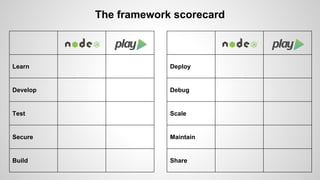



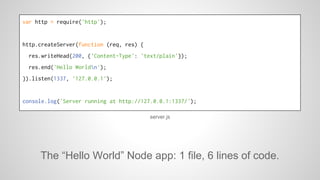



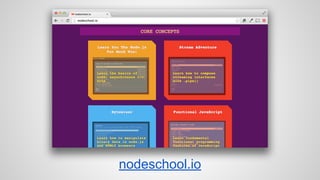
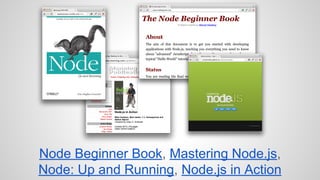

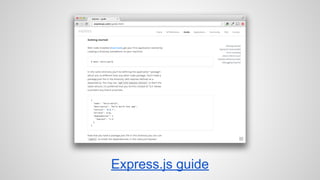






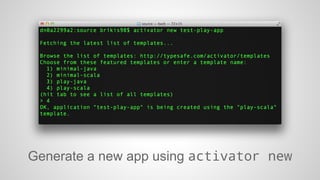













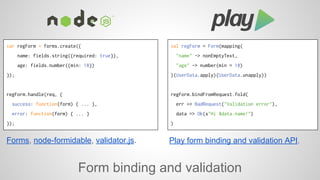
![// Automatically parse application/json body
app.use(bodyParser.json());
app.post('/clients', function (req, res, next) {
var name = req.body.name;
var age = req.body.age;
res.send(name + " is " + age + " years old.");
});
POST /clients Clients.create
case class Person(name: String, age: Int)
implicit val prsnFmt = Json.format[Person]
def create = Action(parse.json) { request =>
val person = request.body.as[Person]
Ok(s"$person.name is $person.age years old")
}
bodyParser, xml2js, node-formidable. Play JSON, XML, File Upload APIs.
JSON, XML, File Upload](https://image.slidesharecdn.com/node-140904200404-phpapp02/85/Node-js-vs-Play-Framework-39-320.jpg)

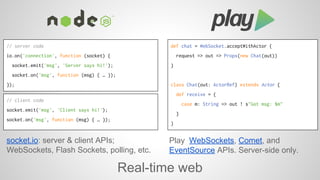
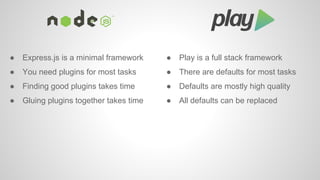


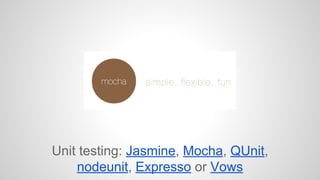

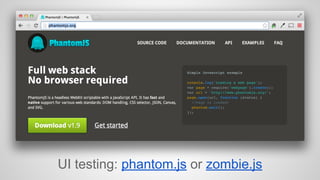


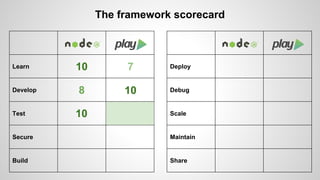






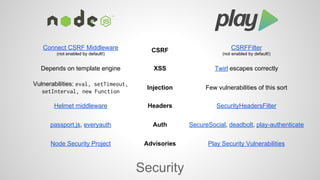


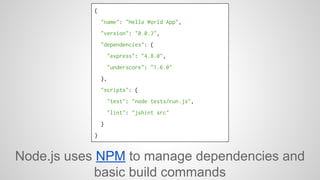












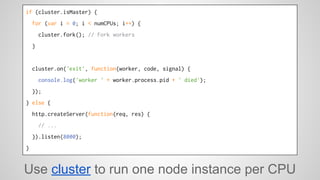






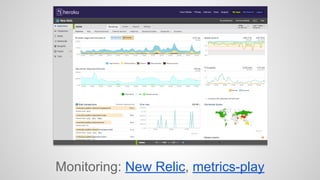











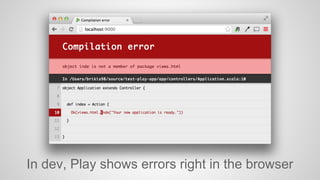








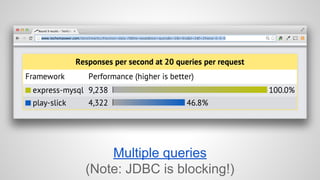

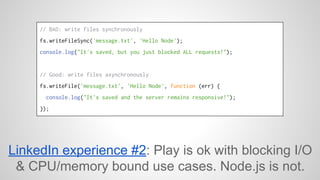






















![def sort(a: List[Int]): List[Int] = {
if (a.length < 2) a
else {
val pivot = a(a.length / 2)
sort(a.filter(_ < pivot)) :::
a.filter(_ == pivot) :::
sort(a.filter(_ > pivot))
Functional programming
}
}](https://image.slidesharecdn.com/node-140904200404-phpapp02/85/Node-js-vs-Play-Framework-126-320.jpg)

![val NameTagPattern = "Hello, my name is (.+) (.+)".r
val ListPattern = "Last: (.+). First: (.+).".r
// Case classes automatically generate immutable fields, equals, hashCode, constructor
case class Name(first: String, last: String)
// Use Option to avoid returning null if there is no name found
def extractName(str: String): Option[Name] = {
Option(str).collectFirst {
// Pattern matching on regular expressions
case NameTagPattern(fname, lname) => Name(fname, lname)
case ListPattern(lname, fname) => Name(fname, lname)
}
}
Very expressive: case classes, pattern
matching, lazy, option, implicits](https://image.slidesharecdn.com/node-140904200404-phpapp02/85/Node-js-vs-Play-Framework-128-320.jpg)






